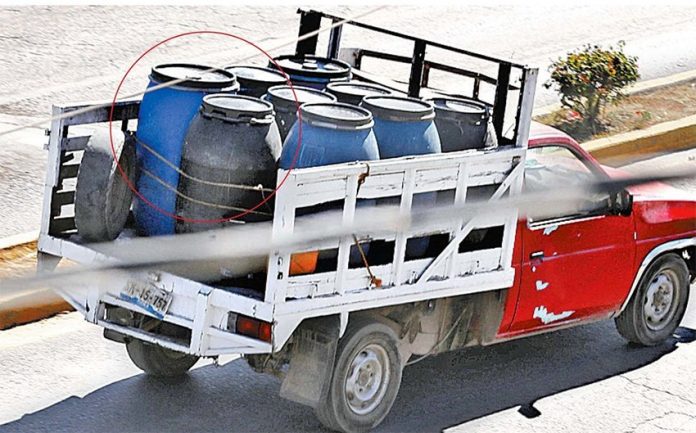President López Obrador declared this week that the federal government’s anti-fuel theft strategy is yielding impressive results, albeit with the unintended consequence of generating widespread gasoline shortages.
Before the plan was implemented, he said on Monday, enough fuel to fill 787 tanker trucks was stolen daily.
Now that figure has been reduced to 177 tankers a day, he said, boasting that the strategy had already generated savings of 2.5 billion pesos (around US $130 million).
But in Mexico’s capital huachicolera, or fuel-theft capital, illegal pipeline taps and the distribution and sale of stolen gasoline continue unabated.
The only thing that has changed in San Martín Texmelucan, Puebla, is the fuel thieves’ schedule.
Hours before López Obrador addresses reporters at his daily 7:00am press conference, the thieves, known as huachicoleros or picadores de ductos (pipeline picadors), are already at work.
One of them told the newspaper Milenio that he and his accomplices now go out “at two or three in the morning to avoid [the police and military] operations,” explaining everything’s “calm at that time.”
Identified only as Alberto, the thief – who learned his dangerous and illegal trade in Tierra Blanca, Veracruz, while working with the Zetas drug cartel – explained the entire pipeline tapping process.
Pemex’s “no digging” signs make the pipelines easy to find, he said, explaining that they are usually buried just a meter or so underground.
Once a pipeline is located, Alberto gets to work to perforate it, with three halcones – hawks or lookouts – positioned strategically to warn of any approaching authorities.
“First you solder on a nipple . . . then you put on a carbon steel valve and a clamp . . .” he explained.
Once the pipeline has been pierced, the fuel shoots up into the air, Alberto said. “. . . we immediately have to connect a hose to start to fill the tanks.”
The pipeline picador, who has 10 years’ experience in Puebla, Veracruz and Tamaulipas, said he has never received any instructions or assistance from employees of the state oil company, Pemex.
“They have nothing to do with it, one just learns how to do it,” he said, adding that the method he uses to tap pipelines is “safer and faster” than the one used “15 years ago.”
Asked what he does if the authorities arrive during the course of his work, Alberto responded: “If they’re very close, well, we run.”
Each pipeline tap, which Alberto can complete in just half an hour, yields enough fuel to fill two 30,000-liter tanker trucks.
The expert driller, who works with different gangs of fuel thieves, charges 5,000 pesos (US $260) for his services.
The drivers of the tankers filled with the illicitly obtained fuel earn between 500 and 1,000 pesos (US $26 to $52) for each load they transport, Alberto said.
Fuel thieves told Milenio that stolen fuel from San Martín Texmelucan, which is located about 40 kilometers northwest of Puebla city, sells for 10 pesos a liter.
Three pesos goes to the owner of the land where the pipeline was perforated, three pesos goes to security expenses and the remaining four pesos is profit for the thieves themselves.
Video recorded by Milenio shows vehicles transporting stolen fuel in barrels traveling on the main highway leading into Texmelucan.
At one point in the footage, a small truck transporting stolen fuel passes an army jeep transporting soldiers deployed to combat fuel theft.
However, halcones patrol the streets on motorcycles to alert criminal gangs of the whereabouts of authorities.
According to Milenio, a large portion of the population of Texmelucan is involved in the illicit fuel trade in one way or another.
If the owners of land where pipelines are located refuse to grant access to fuel thieves, they are routinely threatened. Some land owners who have declined to cooperate have seen their properties set alight while others have been killed.
Fuel theft is estimated to have cost Mexico 97 billion pesos (US $5 billion at today’s exchange rate) during former president Enrique Peña Nieto’s six-year term.
Combating the crime is one of the biggest challenges faced by the new federal government.
Gangs involved in fuel-theft often clash with authorities and each other, causing the homicide rate in some parts of the country, such as Guanajuato, to surge.
Source: Milenio (sp)
